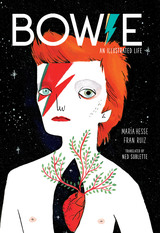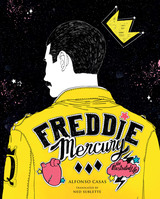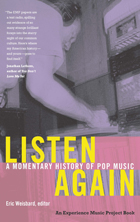
David Bowie was a master of artifice and reinvention. In that same spirit, illustrator María Hesse and writer Fran Ruiz have created a vivid retelling of the life of David Robert Jones, from his working-class childhood to glam rock success to superstardom, concluding with the final recording sessions after his cancer diagnosis.
Narrated from the rock star’s point of view, Bowie colorfully renders both the personal and the professional turning points in a life marked by evolution and innovation. We see Bowie facing the sorrow of his brother’s mental illness, kicking a cocaine habit while other musicians succumbed to deadly overdoses, contending with a tumultuous love life, and radiating joy as a father. Along the way, he describes how he shattered the boundaries of song and society with a counterculture cast that included Iggy Pop, Brian Eno, and Freddie Mercury—as well as his own creations, Ziggy Stardust and the Thin White Duke.
Evocatively illustrated from start to finish, Bowie is a stellar tribute to an inimitable star.

The music of Queen and powerhouse lead singer Freddie Mercury are best experienced with the volume turned all the way up. Alfonso Casas’s Freddie Mercury delivers a sonorous homage to the formidable singer and the turning points that produced a game-changing body of music that continues to inspire fans around the globe.
First published in Spain and now available worldwide, this luminous work covers Freddie's three “births”: his birth as Farrokh Bulsara in Zanzibar; his adoption of the last name of Mercury and the launch of Queen with Brian May and Roger Taylor; and the emergence of the lasting legend after Freddie’s death at the age of forty-five. Casas's evocative illustrations highlight the key moments in the singer’s transformation from child prodigy to superstar, bringing to life the bold innovator who broke free of his conventional upbringing. Chronicling events from Freddie’s marriage to Mary Austin and early fame in London’s 1970s glam scene, to the making of multiple megahits (including the six-minute chart-topper “Bohemian Rhapsody”), to his final years in a lasting relationship with Jim Hutton, Freddie Mercury is an exhilarating, poignant portrait of a creative genius who lived life to the hilt.

Building a history of pop music out of unexpected instances, critics and musicians delve into topics from the early-twentieth-century black performer Bert Williams’s use of blackface, to the invention of the Delta blues category by a forgotten record collector named James McKune, to an ER cast member’s performance as the Germs’ front man Darby Crash at a Germs reunion show. Cuban music historian Ned Sublette zeroes in on the signature riff of the garage-band staple “Louie, Louie.” David Thomas of the pioneering punk band Pere Ubu honors one of his forebears: Ghoulardi, a late-night monster-movie host on Cleveland-area TV in the 1960s. Benjamin Melendez discusses playing in a band, the Ghetto Brothers, that Latinized the Beatles, while leading a South Bronx gang, also called the Ghetto Brothers. Michaelangelo Matos traces the lineage of the hip-hop sample “Apache” to a Burt Lancaster film. Whether reflecting on the ringing freedom of an E chord or the significance of Bill Tate, who performed once in 1981 as Buddy Holocaust and was never heard from again, the essays reveal why Robert Christgau, a founder of rock criticism, has called the EMP Pop Conference “the best thing that’s ever happened to serious consideration of pop music.”
Contributors. David Brackett, Franklin Bruno, Daphne Carr, Henry Chalfant, Jeff Chang, Drew Daniel, Robert Fink, Holly George-Warren, Lavinia Greenlaw, Marybeth Hamilton, Jason King, Josh Kun, W. T. Lhamon, Jr., Greil Marcus, Michaelangelo Matos, Benjamin Melendez, Mark Anthony Neal, Ned Sublette, David Thomas, Steve Waksman, Eric Weisbard
READERS
Browse our collection.
PUBLISHERS
See BiblioVault's publisher services.
STUDENT SERVICES
Files for college accessibility offices.
UChicago Accessibility Resources
home | accessibility | search | about | contact us
BiblioVault ® 2001 - 2024
The University of Chicago Press









